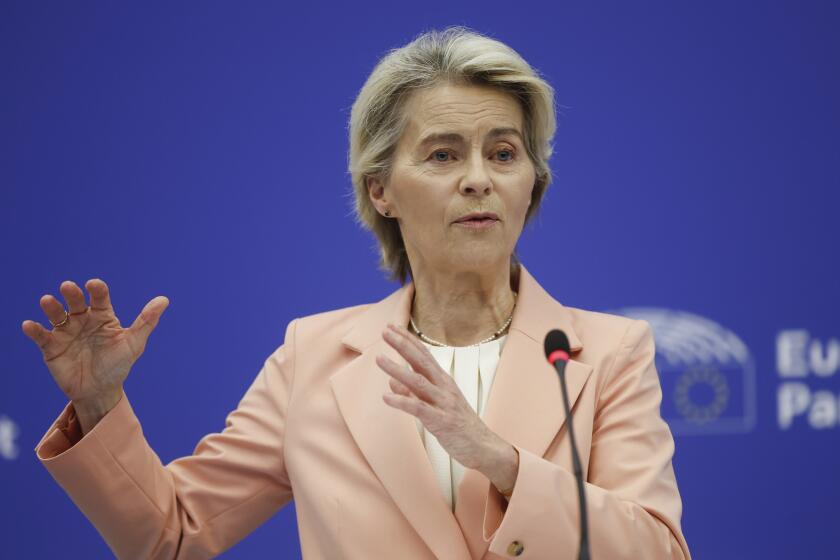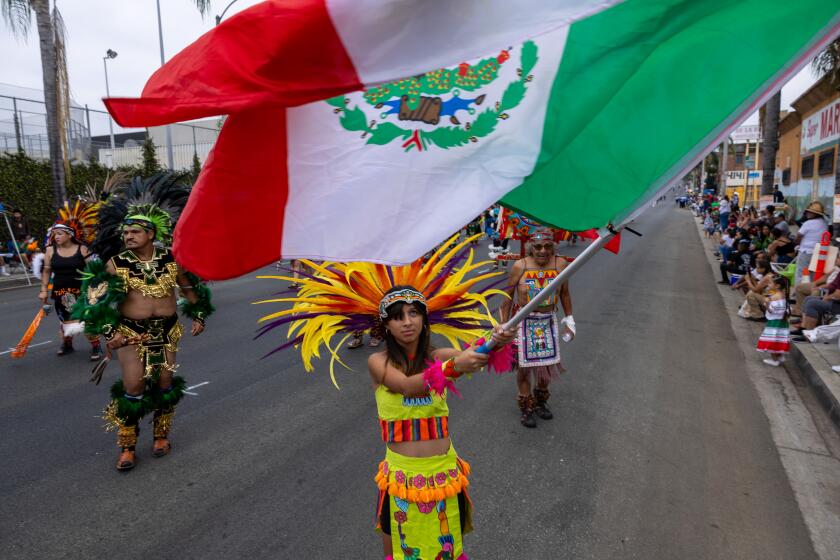Gay Marriages in Mass. Survive Vote
After six hours of emotional debate, Massachusetts lawmakers Wednesday defeated a constitutional amendment that would have defined marriage as a union between one man and one woman but allowed for civil unions between same-sex couples.
In their frantic attempt to solve the state’s crisis over gay and lesbian marriage, the legislators also narrowly rejected a second amendment that would have banned same-sex marriage altogether.
Outside the statehouse, demonstrators on both sides of the issue clogged narrow streets and sidewalks. Many came from out of state, a reflection of how divisive the issue has become -- not just in Massachusetts but nationwide.
By the time Senate President Robert Travaligni, a Democrat, gaveled the constitutional convention to its start, supporters and opponents of gay marriage crowded the halls of the statehouse. Some carried American flags, while others wore or held rainbow flags -- a symbol of gay rights and tolerance.
The annual joint session of the state Legislature, will reconvene here today; lawmakers are set to consider at least two other proposals to change the Massachusetts Constitution in the wake of a state court decision legalizing same-sex marriage.
“This is not over,” Mary Bonauto, a lawyer for six same-sex couples whose lawsuit prompted the Supreme Judicial Court ruling, said late Wednesday. Behind her, beleaguered-looking legislators filed out of the chamber.
Senate Minority Leader Brian Lees, a Republican and co-author of the defeated civil union amendment, said that a nearly identical bill would be introduced today under the sponsorship of House Speaker Thomas Finneran, a Democrat. Lees said he expected Finneran’s bill to pass because state representatives outnumber their Senate counterparts and are more likely to endorse a bill supported by their leadership.
“I can add, and it doesn’t bother me. Pride of authorship has nothing to do with this issue,” Lees said. Despite the two defeated amendments, he called Wednesday’s legislative action “hugely significant. We moved the issue farther than anyone thought possible.”
The legislators voted 104 to 94 against the civil union amendment and defeated the same-sex marriage ban by just two votes.
The civil union measure was one of a series of hastily crafted proposals designed to negate the court ruling, which beginning in May would make Massachusetts the first state to allow gays and lesbians to marry.
A Supreme Judicial Court advisory opinion last week decreed that civil unions would not satisfy the court’s requirements. That prompted fast action from lawmakers anxious to prevent Massachusetts from becoming a mecca for gay marriage.
Changing the constitution -- the oldest in America -- requires legislators first to approve an amendment by a majority vote. One year after that vote, the Legislature must again vote its approval. Then the matter must be taken to citizens as a referendum.
If legislators approve an amendment in the current constitutional convention, the general population would not be able to vote on it until November 2006. Under the civil union amendment defeated Wednesday night, same-sex couples who married between May and the November 2006 election would have had their status converted to civil union.
Seeking to “minimize disruption of the commonwealth,” Gov. Mitt Romney, a Republican, said Wednesday that he opposed codifying civil union as part of the state constitution.
His preference, Romney said, was “as narrow a definition as possible -- defining marriage only as a union between a man and a woman.” The governor said his staff has been deluged with inquiries from Washington and around the country about how Massachusetts intends to settle the same-sex marriage controversy.
Only Belgium, the Netherlands and two provinces in Canada permit gays and lesbians to marry.
As thousands of demonstrators from both sides mingled in and around the statehouse -- shouting conflicting opinions, singing and praying -- lawmakers assembled for their joint session. Other matters pending before the annual gathering were deferred in favor of the same-sex marriage debate.
Wednesday’s contentious session provoked emotional outpourings from members of a deeply divided Legislature. Lawmakers said they had received thousands of calls, letters and e-mails from constituents. One said his office computer crashed from the volume.
Only two legislators were absent -- one for health reasons and one who is leaving the state to take a job in Washington.
Every lawmaker spoke of anguishing over whether to include same-sex marriage in the state constitution.
“This is the toughest vote in five decades that I have ever had to take,” said Rep. David Flynn, a Democrat from Bridgewater, southeast of Boston.
As they struggled over how best to institutionalize a definition of marriage, lawmakers talked about religion, historical oppression and the evolving nature of family dynamics.
They reflected on the proper balance of power in government, and invoked personal experiences involving their own marriages or the relationships between gay and lesbian friends and relatives.
“As a wife, mother and grandmother, I have always had a traditional view of marriage,” said Sen. Harriette L. Chandler, a Democrat from Worcester, in central Massachusetts. “But this amendment discriminates against some of our citizens, and it is wrong.”
The divisive atmosphere was apparent, as Finneran used his authority as House speaker to place the amendment banning gay marriage at the top of the legislative agenda.
“Every institution in recorded history up to this time -- including Massachusetts -- has defined marriage as a union between one man and one woman,” the speaker told his colleagues. “And 38 states already have adopted [defense of marriage] statutes.” But Finneran’s attempt to ban gay marriage drew sharp responses from some of his colleagues.
“I cannot vote to use the constitution to exclude human beings from the pursuit of their own happiness,” declared Rep. Lida Harkens, a Democrat from Needham, near Boston.
Sen. Brian Joyce, a Democrat from Milton, south of Boston, said he viewed his own marriage 17 years ago in the Catholic Church as “a gift from God.” But, Joyce went on, “I believe in an America where no religious body seeks to impose its will, directly or indirectly. Tradition as a rationale for discrimination is not persuasive.”
The urgent nature of the topic prompted George Willett, 47, and his friend Ken Adamson, 54, to ride the train 30 minutes into Boston before sunrise, claiming two of only 135 public seats for the debate.
Although neither man had ever set foot in the statehouse before, both kissed their wives goodbye and took the day off to attend what they called a historic moment for Massachusetts and the country.
“Allowing same-sex marriage degrades society,” said Adamson, a printer. “I support marriage as an institution between one man and one woman.”
In contrast to the quiet spectators’ gallery, hundreds of gay-marriage supporters and opponents sat on the floor in the statehouse’s soaring Great Hall, watching the proceedings on large-screen televisions.
Both sides clapped and hooted in approval as legislators voiced conflicting points of view.
“My mother is white and my father is black,” said Erik Murray-Knox, 33. “When they first met, they could not get married. The issue that is before us today is very reminiscent of those earlier battles.”
Murray-Knox, a lawyer, said the Legislature’s effort to undo a court ruling was misplaced. “I think the court’s decision was absolutely correct,” he said. “And that should be the end of it.”
But Anna Amaral, a retired schoolteacher from western Massachusetts, could barely contain her despair. “If this goes through, incest is going to be the next thing on our hands,” she said.
More to Read
Sign up for Essential California
The most important California stories and recommendations in your inbox every morning.
You may occasionally receive promotional content from the Los Angeles Times.










